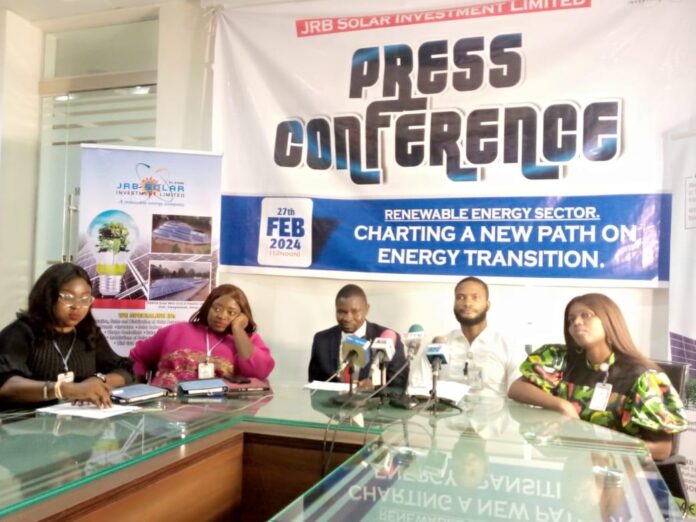Bridging Energy Gap: JRB Solar advocates more government support to indigenous renewable energy companies
*Set to roll out solar assembly plant, first of its kind in Nigeria
In order to bridge the yawning energy gap in Nigeria, a leading indigenous renewable energy company, JRB Solar Investment, has advocated increased government support for indigenous renewable energy providers in the country. It said the energy deficit in Nigeria is worrisome and noted that the surest way out of the unacceptable situation is increased investment in the renewable energy industry.
At the press conference held at its corporate headquarters in Abuja recently, the company called on the government to be more intentional in supporting indigenous renewable energy companies who are working assiduously to bridge Nigeria’s energy gap, especially in rural, underserved, and unserved communities.
Speaking at the briefing, the Managing Director and Chief Executive of JRB Solar Investment Limited, Dr Jimoh Rauf Badamosi, said energy needs in the country cannot be met by the government alone, and as such, the intervention of indigenous renewable energy providers has become inevitable. He said JRB Solar, as a formidable indigenous player in the industry, is primed to play its part with consistent improvements in innovations and cutting-edge technology.

“We are aware that the government cannot solve all the problems; this is why we are stepping in to close the gap and enhance the socioeconomic progress in the country. With consistent improvements in innovations and cutting-edge technology, we are primed to play our part efficiently,” he said.
Throwing more lights, the Head, Corporate Communication of the company, Mr Theophilus Enemali, said JRB Solar was compelled to make a clarion call to the government to invest in indigenous renewable energy companies in order to close the electricity gap especially in rural, underserved, and unserved communities. He said, this was by way of empowering the renewable energy companies, through waivers, tax concessions, grants, or funding partnerships, to embark on the local assembly and manufacturing of renewable energy products.
“Here at JRB, we are firm believers in the gains of collective actions between the public and the private sector. As we may all know, there is an interesting interconnection between clean energy, socio-economic development, and environmental sustainability.”.
“One of the ways to empower Nigerians is to make the provision of electricity accessible and affordable to people, especially in neglected and discounted communities. According to a survey, over 90 million Nigerians do not have access to electricity, that represents about 43% of the entire population”.
Read Also:
He lamented that while other countries are making progress in the quest to bridge energy gaps via renewable energy products, Nigeria seems to not have fully realized this imperative.
“Many countries are taking a quantum leap to ensure bigger investment in renewable energy and even setting realizable goals. In Egypt for instance, they have a renewable energy target, whereby they hope to increase the supply of electricity generated from renewable sources to 42% by 2035 with solar, with the largest percentage at 25%.
“We can do the same thing in Nigeria and join the league of top countries doing well in renewable energy. I know Nigeria has a renewable energy target whereby by 2030, we hope to generate 30% of electricity from renewable sources. But like many visions we have set in Nigeria, we hope this will be different. This is why we are calling on government, both federal and state governments, to think of investing in solar energy, as an alternative to the national grid”.
The current administration, led by President Bola Ahmed Tinubu, signed into law the electricity bill in June 2023; this empowers states, companies and even individuals to generate, transmit and distribute electricity. It’s a new dawn for many state governments across the federation to invest in renewable energy.
“We are therefore calling on the government through relevant Ministries and agencies like the, The Ministry of Power, Rural Electrification Agency, Energy Commission of Nigeria, NASENI and others to partner with indigenous renewable energy companies in building interconnected Hybrid Solar Mini-Grid Plants in rural and underserved communities. This will definitely be a game changer in the energy sector”.
On what stands JRB Solar Investment Limited out in terms of capacity, technology and service, the Head Solar Department, Engr Prince Bernard, said the company is breaking new grounds with consistent improvement in the innovation and cutting-edge technology, in order to provide reliable renewable energy products not just for Nigerian market but also for the sub-region.
He said the company will soon roll out its state-of-the-art solar panel assembly plant which is first of its kind in Nigeria to meet the growing need for renewable energy solutions in the country.
“We have powered many rural communities, corporate organizations and homes. A typical example is the 100 KWP PV system at Kwalita village in Gwagwalada, FCT here. We are all out to deliver with the global best practices. There is also an ongoing project at Federal Head of Service, Abuja with 1MW Solar Capacity which also is in 2 phases, phase 1 of 500KW is ongoing at the moment which will be commissioned by next month”.
“The installation of the ongoing project in Onne, Rivers State is another monumental proof that solar energy is now a real deal with 1MW of Solar Capacity which are in two phases, of which the phase 1 is ongoing with a capacity of 400KW. Phase 2 will soon kick off by last quarter of this year”.
“As we keep engaging in the clean energy transition, our focus is shifting into building mini grids for communities and not just installation of solar panels in homes and corporate organizations”, he concluded.




